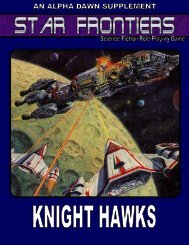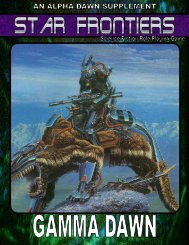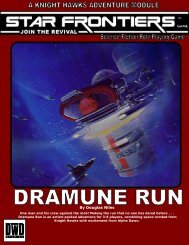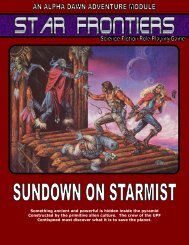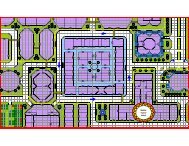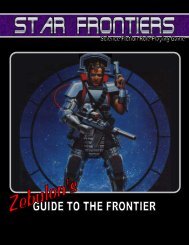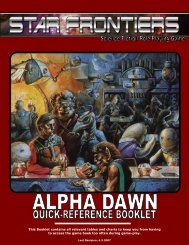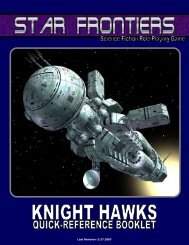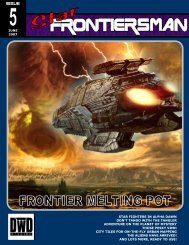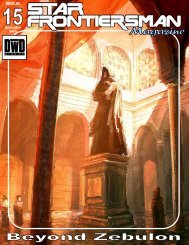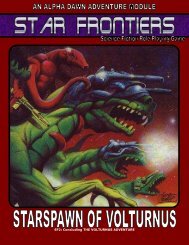Alpha Dawn - Star Frontiersman
Alpha Dawn - Star Frontiersman
Alpha Dawn - Star Frontiersman
You also want an ePaper? Increase the reach of your titles
YUMPU automatically turns print PDFs into web optimized ePapers that Google loves.
Prioritizing Variable Skill Levels<br />
If using the Prioritizing Ability Scores rule, above,<br />
you may opt to favor your roll on the beginning skill<br />
levels table instead of favoring an ability pair. Or,<br />
you may decide to slight your roll on this table to<br />
meet some concept of a less-skilled/naive character.<br />
If you favor your skill roll, simply roll twice and take<br />
the best roll. If you slight your skill roll, roll twice<br />
and take the lowest roll.<br />
4 Variable<br />
Wealth<br />
The standard game rules make a player roll<br />
d100+250 for starting money. This works fine for a<br />
certain level of beginning play, but some referees<br />
may wish to adjust this by rolling on the following<br />
table for starting wealth. Note that this is for the<br />
express purpose of selecting starting equipment,<br />
and players cannot use this to start off with several<br />
hundred extra Credits. He must spend as many as<br />
possible, and may not begin play with more than<br />
100Cr remaining.<br />
156<br />
Wealth<br />
Roll Result<br />
01-20 Poorly Equipped<br />
d100+100Cr.<br />
21-70 Typical<br />
d100+250Cr.<br />
71-85 Well-Equipped<br />
d100+500Cr.<br />
86-95 Very Well-Equipped<br />
d100+750Cr.<br />
96-00 Extremely Well-Equipped<br />
d100+1000Cr.<br />
Prioritizing Variable Wealth<br />
If using the Prioritizing Ability Scores rule, above,<br />
you may opt to favor your roll on the beginning<br />
wealth levels table instead of favoring an ability<br />
pair. Or, you may decide to slight your roll on this<br />
table to meet some concept of a poorly equipped<br />
character. If you favor your wealth roll, simply roll<br />
twice and take the best roll. If you slight your<br />
wealth roll, roll twice and take the lowest roll.<br />
5<br />
Edges &<br />
Flaws<br />
This rule helps flesh-out a character, making him<br />
more than a collection of numbers and choices.<br />
Using this rule, your character has one Edge and<br />
one Flaw.<br />
Edge. An Edge is something that provides a bonus<br />
or perk to your character. It may be something that<br />
ties him to the Frontier (having a wealthy patron,<br />
for example), or may be something that helps him<br />
accomplish his missions effectively (well-connected<br />
in the underworld). It may be something that<br />
simply boosts his chances of success under certain<br />
circumstances (such as being a talented<br />
Swordsman, or extraordinarily observant). An Edge<br />
could even be a source of aid, financial or otherwise<br />
(such as being independently wealthy, or having an<br />
informant among Pan Galactic Corporation who<br />
provides information).<br />
There is no finite list of Edges. Creative players can<br />
be as broad or as focused as they would like with<br />
the selection of their one Edge, but referees will be<br />
overseeing the selection.<br />
During game play, the player can call on his Edge<br />
only once per sitting. When he relies on his Edge,<br />
he can invoke one of the following abilities, relevant<br />
to the situation.<br />
• Swap the tens die and the ones die to flip-flop a<br />
percentile roll relevant to your Edge, whether<br />
you’re the one who rolled it or not.<br />
• Get a one-time situational bonus of +25 to any<br />
one roll that is relevant to your Edge.<br />
• Provide an in-game opportunity for aid or<br />
assistance relevant to your Edge (“Hey – I think I<br />
know someone who lives near here. She should<br />
be able to give us shelter”).<br />
• Ignore damage just taken in the same combat<br />
turn as long as the situation is relevant to your<br />
Edge.<br />
• Provide a means by which to acquire d10x100 Cr,<br />
as long as a rationale can be stated that is<br />
relevant to your Edge.<br />
For example: a bounty hunter character’s player<br />
decides to give him an Edge called “Hard Target” –<br />
stating that his character’s professional talent and<br />
skill makes him hard to sneak up on and hard to hit<br />
in combat. In game, once per session, his player<br />
may invoke his Edge and use it to affect a previously<br />
rolled action (flip-flop the dice), ignore damage just<br />
rolled against him, or even to find a way to make his<br />
hard-to-hit nature profitable (“Hey barkeep – I’ll bet<br />
you 50Cr you can’t hit me with that stunner...”).<br />
Flaw. A Flaw is the opposite of an Edge. It provides<br />
a situational penalty, or somehow causes difficulties<br />
or troubles for your character. It can be something<br />
as simple and seemingly-harmless as having a<br />
girlfriend, or can be something potentially deadly<br />
like owing a loan-shark a large sum of money.<br />
Flaws provide story hooks for the referee to draw<br />
on, and can cause the story to become complex.



